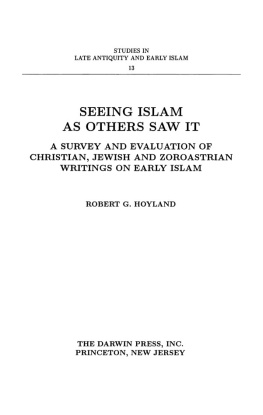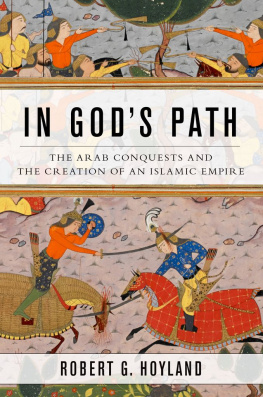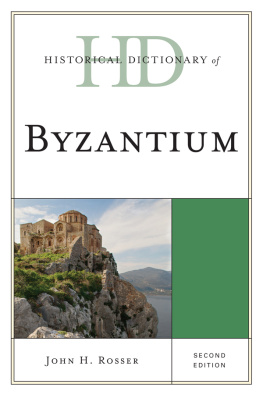THE THRONE OF ADULIS
EMBLEMS OF ANTIQUITY
Font of Life
Ambrose, Augustine, and the Mystery of Baptism
GARRY WILLS
Medusas Gaze
The Extraordinary Journey of the Tazza Farnese
MARINA BELOZERSKAYA
The Throne of Adulis
Red Sea Wars on the Eve of Islam
G. W. BOWERSOCK
THE THRONE of ADULIS
RED SEA WARS ON THE EVE OF ISLAM

G. W. BOWERSOCK


Oxford University Press is a department of the University of Oxford.
It furthers the Universitys objective of excellence in research,
scholarship, and education by publishing worldwide.
Oxford New York
Auckland Cape Town Dar es Salaam Hong Kong Karachi
Kuala Lumpur Madrid Melbourne Mexico City Nairobi
New Delhi Shanghai Taipei Toronto
With offices in
Argentina Austria Brazil Chile Czech Republic France Greece
Guatemala Hungary Italy Japan Poland Portugal Singapore
South Korea Switzerland Thailand Turkey Ukraine Vietnam
Oxford is a registered trade mark of Oxford University Press
in the UK and in certain other countries.
Published in the United States of America by
Oxford University Press
198 Madison Avenue, New York, NY 10016
Oxford University Press 2013
All rights reserved. No part of this publication may be reproduced,
stored in a retrieval system, or transmitted, in any form or by any means, without the
prior permission in writing of Oxford University Press, or as expressly permitted by law,
by license, or under terms agreed with the appropriate reproduction rights organization.
Inquiries concerning reproduction outside the scope of the above should be sent
to the Rights Department, Oxford University Press, at the address above.
You must not circulate this work in any other form, and you must impose
this same condition on any acquirer.
Library of Congress Cataloging-in-Publication Data
Bowersock, G. W. (Glen Warren), 1936
The Throne of Adulis : Red Sea wars on the eve of Islam / G. W. Bowersock.
p. cm.(Emblems of antiquity)
Includes bibliographical references and index.
ISBN 978-0-19-973932-5
1. Himyar (Yemen)History6th century. 2. JewsYemen (Republic)HimyarHistory
6th century. 3. Arabian PeninsulaHistoryTo 622. 4. Aksum (Kingdom)History 6th century.
5. Red Sea RegionHistory6th century. 6. JudaismRelationsChristianityHistory6th century. 7. Christianity and other religionsJudaismHistory6th century. I. Title.
II. Series: Emblems of antiquity.
DS231.B69 2013
939.49dc23 2012023593
1 3 5 7 9 8 6 4 2
Printed in the United States of America
on acid-free paper
Contents
Chapter One
THE THRONE
Chapter Two
A CHRISTIAN TRAVELER IN THE RED SEA
Chapter Three
PTOLEMYS ELEPHANTS
Chapter Four
THE KINGDOM OF AXUM
Chapter Five
CHRISTIANITY COMES TO AXUM
Chapter Six
JUDAISM COMES TO IMYAR
Chapter Seven
THE ETHIOPIAN INVASION OF 525
Chapter Eight
ENTRY OF THE GREAT POWERS
Chapter Nine
RECKONING
The idea of a short book centered on the inscribed throne at Adulis first occurred to me over thirty years ago when I read an article that A. F. L. Beeston published in the Bulletin of the School of Oriental and African Studies 43 (1980), 453458. His arresting title was The Authorship of the Adulis Throne. Because I had long recognized that anything from the pen of Freddy Beeston deserved careful attention, I read his article, which touched upon work that I was doing at the time on Roman Arabia, with particular interest. Some ten years before that, Freddy had attended a lecture I gave in Oxford on Roman policy in the Near East, and his conversation was then, as it always was, convivial, instructive, and memorable. We met again occasionally after that, but his work was never far from my desk. Freddy had rightly identified the inscription on the Adulis Throne as a still unsolved problem. Although he was not concerned with the other, and much earlier, inscription on the stele that lay beside the throne, his reflections on the throne text showed his legendary mastery of South Arabian language and epigraphy.
Like most scholars today, I cannot accept the hypothesis that Freddy advanced, albeit with due caution, as an interpretation of the throne inscription, and at this late date there is no point in trying to engage with it or refute it. His notion that a imyarite king put up the throne and its inscription cannot now withstand the powerful evidence of the Ethiopic epigraphy at Axum or of the many other thrones for which traces survive. But Freddy saw clearly that the throne at Adulis, which first received widespread attention only when J. W. McCrindle published his English translation of Cosmas Indicopleustes in 1897, could be a fundamental document for understanding the complex wars and religious struggles that played out in the Red Sea area in the three or four centuries before Islam. Freddys article in 1980 was pathbreaking.
When I published my Roman Arabia in 1983, the Jewish kingdom of converted Arabs in imyar had seemed to me perhaps the most extraordinary of all the nations of the late antique Near East. As this kingdom lay outside the territory of Roman Arabia, I had contemplated a complementary volume entitled Jewish Arabia, but at that time it seemed that such a title might bring more misunderstanding than enlightenment. The documentation then was considerably more exiguous than it is now. But with all that we have learned in recent years, the story of the Jews of imyar, in the context of their relations with Ethiopian Christians across the Red Sea, has become much more accessible. This is what I have attempted to explore by examining the manifold implications of the Adulis Throne from the Ptolemies to Muammad.
I have had the good fortune of working with a former Princeton graduate student, George Hatke, who had similarly discovered, entirely on his own, the fascination of the imyariteEthiopian confrontation. I was delighted when he invited me to serve as a reader for his thesis, directed by my friend and colleague Michael Cook. Hatke successfully defended his work in November 2010, and I hope very much that the thesis will be published in the near future. It currently bears the title Africans in Arabia Felix: Aksumite Relations with imyar in the Sixth Century C.E. and will be an invaluable resource for scholars who wish to do further research on this topic.
Finally, some of the issues I have raised in my final chapters in connection with the struggles between Ethiopia and South Arabia overlap the first of three lectures that I delivered in Jerusalem in April 2011 in memory of Menahem Stern. These lectures, Empires in Collision in Late Antiquity, carry forward the ByzantinePersian conflict and the rise of Muammad into the seventh century. They examine the Persian capture of Jerusalem in 614 (second lecture) and the collapse of the Persian empire (third lecture). With my head full of this material, I responded with enthusiasm to Stefan Vrankas imaginative idea for a series of volumes on emblematic objects or events in history by reviving the excitement I had felt long before in reading Freddy Beestons demonstration that the Adulis Throne evoked the whole complex world of Red Sea imperialism and religion. Hence I owe no less to Stefan than to Freddy for making this book happen. It will be obvious to any scholar in the field how much I owe to the pioneering work of Christian Julien Robin and his colleagues in Paris. The recent growth of South Arabian epigraphy, of which Robin is a master, has provided welcome confirmation of traditions and suppositions that have been discussed for centuries. As so often in the past, I am deeply indebted to Christopher Jones of Harvard, my friend and colleague of more than fifty years, for a critical reading of these pages.










